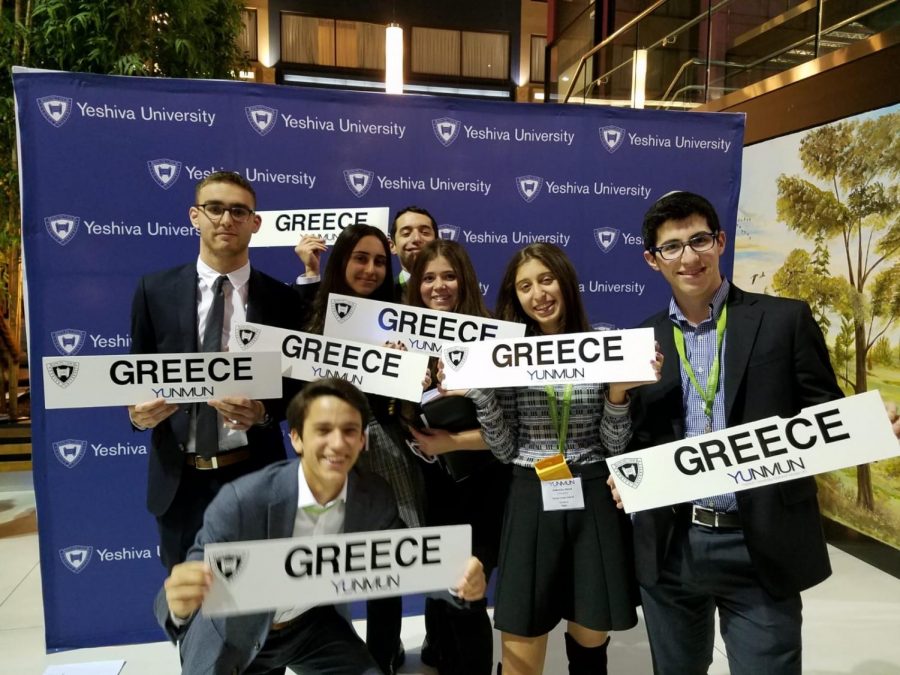Ramaz Takes On YUNMUN LIII
Unlike a majority of Ramaz students, whose break began after the final bell rang on Friday, February 8, vacation would not begin until Tuesday afternoon for the Ramaz Model UN Team, which was busy attending the YU National Model UN conference.
On Sunday, February 10, eight of the team members met at the Crowne Plaza in Stamford, Connecticut. The purpose of this meeting was to mimic the United Nations and try to handle the current problems facing the world through a Model UN.
For the past 29 years, Yeshiva University has held a Model UN for Jewish schools across the world. This year there were 40 schools from across the world, including South Africa, Brazil, Miami, Maryland, New York and Los Angeles to name a few. There were 50 advisers, 70 YU staff, and a total of 420 students, making this conference a unique gathering of the world’s young Jewish population. Ethan Morali ’20 said, “I really appreciate that there were yeshiva kids not only from the tristate area, but also kids from Brazil and South Africa. It was cool that no matter where you came from, we all had ideas but were working with the same goal of wanting to manage world problems.”
Each attending school is assigned a country or two (depending on the size of the delegation). Within each team, each member is assigned to a specific committee in the UN, such as the International Maritime Organization (IMO), International Criminal Court (ICC), and Human Rights Campaign (HRC) to name a few. A representative from each committee is responsible for writing two position papers regarding issues that are making headlines in their specific committee. Each committee member is then tasked with discussing these pressing matters with other representatives from different countries.
This year the Ramaz Upper School took charge of Greece. With its centrally located spot on the water, Greece was instrumental in further advancing the goal of ending maritime problems. At the conference, Greece also played an instrumental role in putting an end to animal trafficking. Each committee needed to draft a resolution with their allies and form connections with other countries to help put an end to specific problems.
The event began with dinner followed by an opening ceremony. Azi Fine, Secretary General of YUNMUN LIII, stated that he chose to re-involve himself in YUNMUN after being a high school attendee because of his experience attending YUNMUN during high school. “I appreciated the relationships I developed with the chairs. Coming back as as college student, I want to meet high schoolers and provide them with the same experience,” said Fine. “It is also nice to have a checkpoint every year where you can spend time to focus on important issues.”
Following this ceremony, the delegates went with their respective committees to meet other representatives from different countries in hopes of having their resolution passed. Delegates focused on their first position paper for majority of the conference, leaving only two of the six sessions for the second topic. During each session, delegates participated in ice breakers and also participated in an information session about Yeshiva University.
The conference helped students develop their public speaking skills (which they worked on while presenting their country’s stance on a topic) and social skills (which they worked on while collaborating with others delegates). Fine added that he hopes all delegates walk away from the conference with two lessons: “I hope the students leave understanding (i) the seriousness of acknowledging what we are dealing with and (ii) have inspiration. Our goal at YUNMUN is to help others develop skills not only needed in high schools, but through the rest of life.”
By the end of the conference, many attendees felt that they had formed a genuine connection to the country they were representing. The Ramaz delegation truly enjoyed their time at YUNMUN and were proud of their work. They look forward to coming back as an even stronger team next year.




